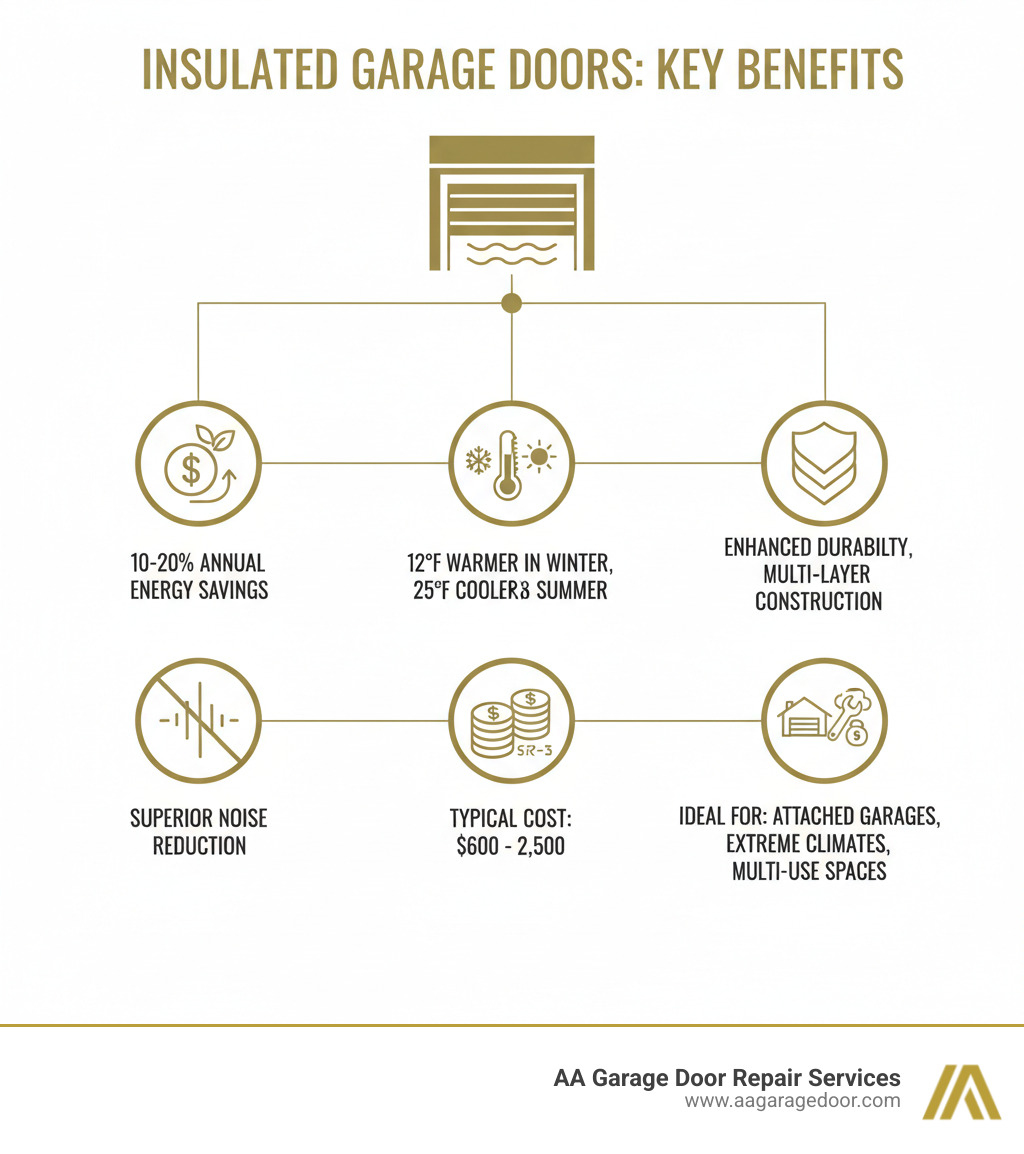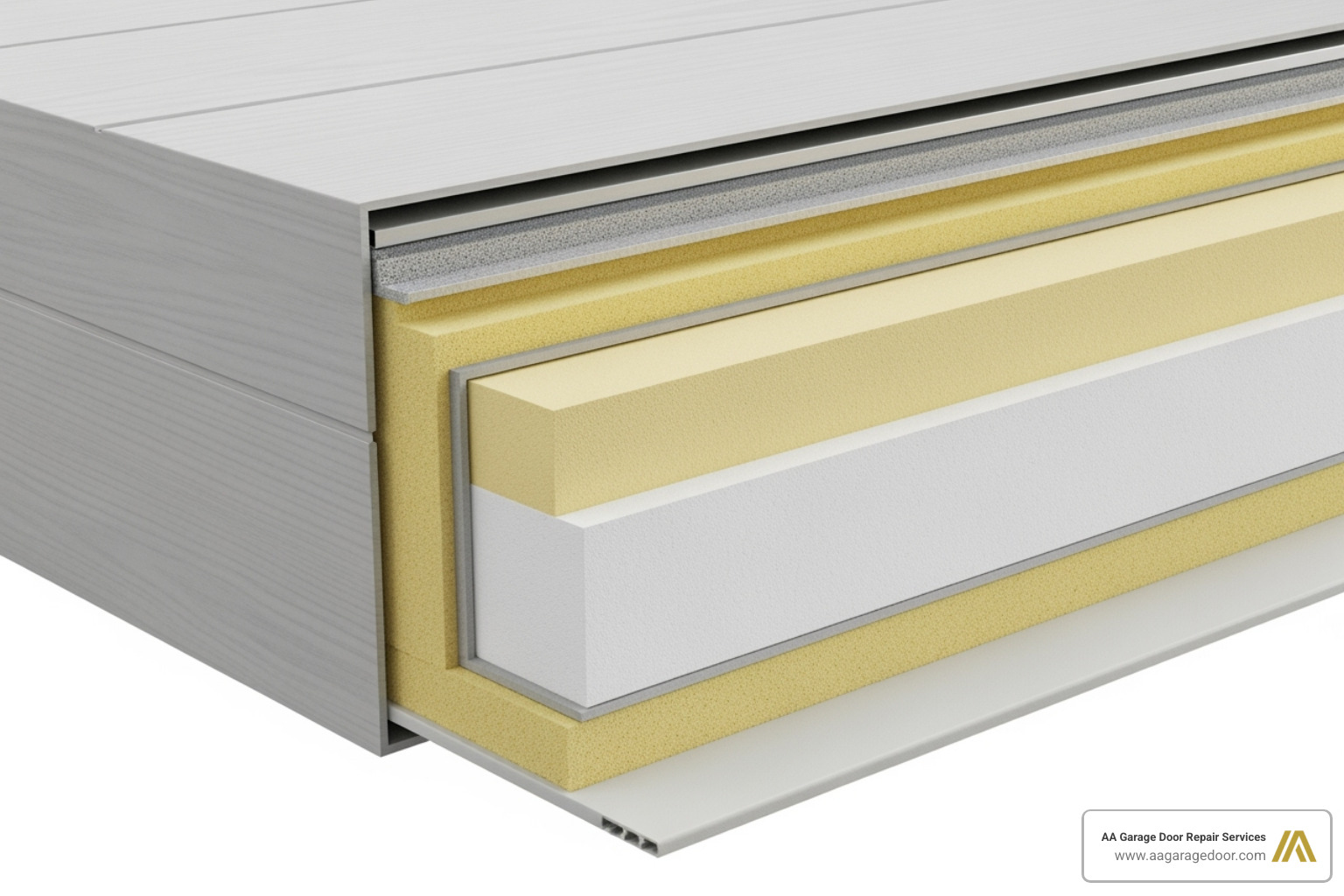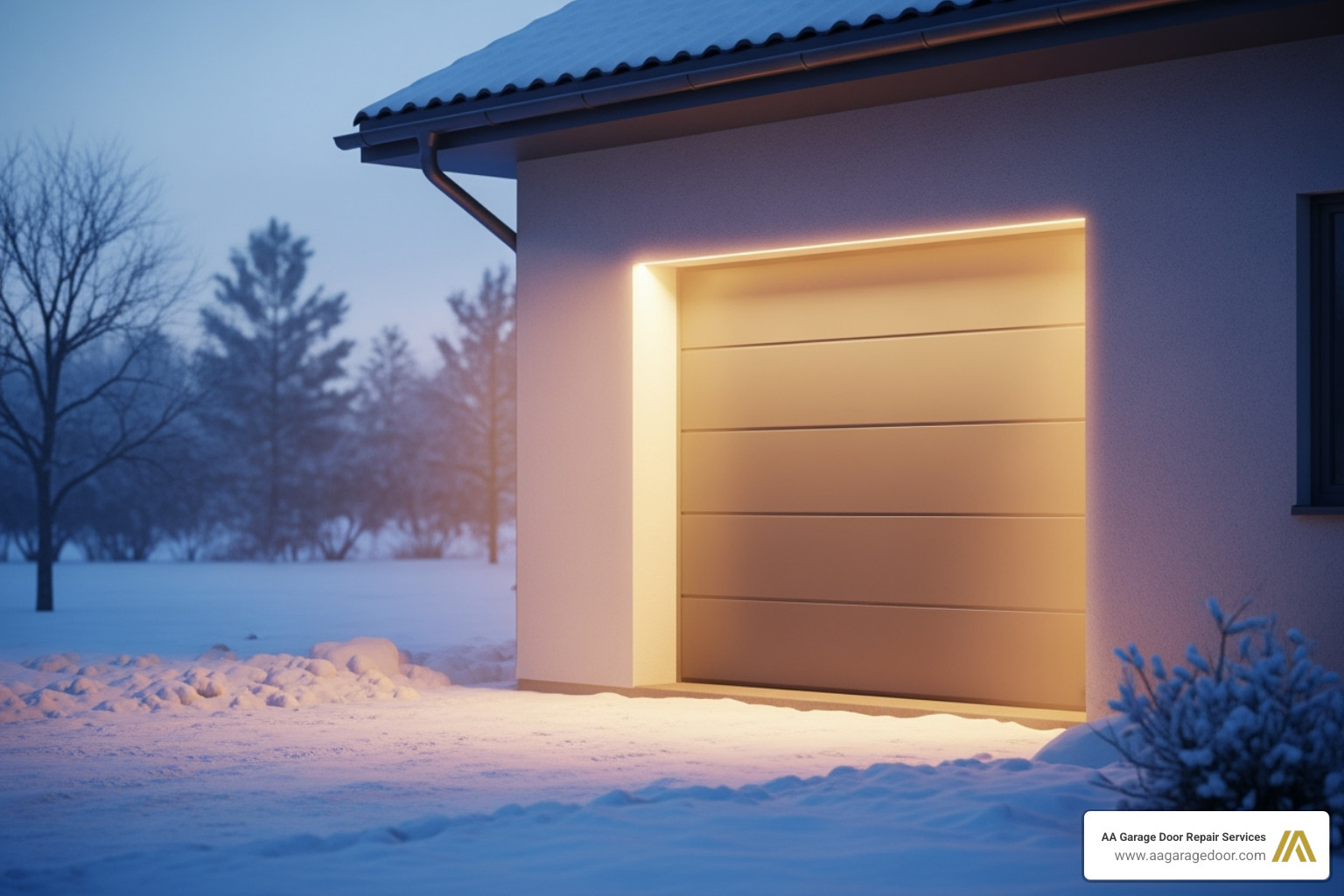Why Homeowners Are Asking About Garage Door Insulation
Are insulated garage doors worth it? The short answer is yes for most homeowners—especially if you have an attached garage, live in a climate with temperature extremes, or use your garage for more than just parking. As a leading provider of expert garage door solutions in the Twin Cities, we’ve seen how this upgrade improves a home’s energy efficiency and comfort. Here’s what you need to know:
Quick Answer:
- Energy Savings: Insulated doors can reduce heating and cooling costs by 10-20% annually.
- Temperature Control: Keep your garage 12°F warmer in winter and 25°F cooler in summer.
- Durability: Multi-layer construction resists dents and lasts longer.
- Noise Reduction: Dampens external noise and operates more quietly.
- Cost: Expect to pay $600-$2,500 for insulated doors vs. $300-$1,500 for non-insulated.
- ROI: Energy savings and increased home value typically justify the higher upfront cost.
An uninsulated garage door is like a massive, unsealed window, allowing heat to escape in winter and pour in during summer. This forces your HVAC system to work overtime, especially if your garage shares a wall with your living space. If you use your garage as a workshop, gym, or storage for sensitive items, insulation becomes essential.
Beyond temperature, the added layers create a stronger, more durable door that resists daily wear and tear. They also dampen noise, a key benefit for homes near busy streets. For most Twin Cities homeowners, the combination of lower energy bills, increased comfort, and higher home value outweighs the price premium over non-insulated options.
I’m David Sands, owner of AA Garage Door LLC. For over 23 years, I’ve helped homeowners determine if an insulated garage door is the right investment for their specific needs. This guide will walk you through the key considerations.

What Is an Insulated Garage Door?
An insulated garage door is an engineered system designed to minimize heat transfer. Unlike a basic single-layer door, it features a core of thermal insulation sandwiched between interior and exterior panels. This multi-layer construction creates a powerful thermal barrier, integrating the largest opening of your home into its overall energy envelope. Understanding this garage door construction is the first step in deciding are insulated garage doors worth it.

Understanding R-Value and U-Factor
When evaluating insulation, you’ll encounter two key metrics: R-value and U-factor.
- R-value measures thermal resistance, or how well a material resists heat flow. A higher R-value means better insulation. A door with an R-18 rating is far more effective than one with an R-6 rating. You can learn more about how R-value applies to home insulation.
- U-factor measures thermal transmittance, or how easily heat passes through. Here, a lower number is better, as it signifies less heat transfer and greater energy savings.
Essentially, a high R-value corresponds to a low U-factor. Both metrics confirm the door’s ability to provide superior thermal resistance.
Common Insulation Materials Compared
The two primary insulation materials used in garage doors are polystyrene and polyurethane.
Polystyrene is a rigid foam board fitted between the door’s panels. It’s a budget-friendly option that offers good insulation, with R-values around R-4.6 to R-5 per inch. While it effectively slows heat transfer, it adds minimal structural strength to the door.
Polyurethane is a liquid foam injected into the door’s cavity, where it expands and bonds to the interior and exterior panels. This process creates a dense, seamless barrier with a higher insulation value, typically R-5.6 to R-8.0 per inch. This bonding process also dramatically increases the door’s rigidity, durability, and sound-dampening properties.
| Feature | Polystyrene Insulation (EPS/XPS) | Polyurethane Insulation (PUR/PIR) |
|---|---|---|
| R-value per inch | R-4.6 to R-5 | R-5.6 to R-8.0 |
| Density | Less dense, lighter rigid panels | Denser, expands to fill all cavities, bonds to door skins |
| Structural Strength | Minimal added strength; primarily a thermal barrier | Significantly improves door rigidity, durability, and impact resistance |
| Cost | More budget-friendly upfront | Higher upfront cost, but better long-term ROI through superior performance |
| Sound Dampening | Good | Excellent, due to dense, gap-filling nature |
| Application | Pre-cut rigid panels fitted between door layers | Liquid foam injected and expanded to fill and bond with panels |
For maximum performance and durability, polyurethane is the superior choice. However, polystyrene provides a solid, cost-effective insulation solution.
The Primary Benefits of an Insulated Garage Door
When weighing if are insulated garage doors worth it, the benefits extend far beyond simple temperature moderation. This upgrade impacts your home’s energy consumption, structural integrity, and daily comfort.

Energy Efficiency and Cost Savings
An insulated garage door can reduce your home’s heating and cooling costs by 10-20% annually. An uninsulated door is a major source of energy loss, forcing your HVAC system to work harder to maintain a comfortable temperature in living spaces adjacent to the garage.
An insulated door stabilizes the garage temperature, keeping it approximately 12°F warmer in winter and 25°F cooler in summer. This thermal barrier reduces HVAC strain and leads to tangible lower utility bills. Over the door’s lifespan, these energy savings can often offset the initial higher cost.
Improved Durability and Strength
Insulation makes a garage door significantly tougher. The sandwich construction, with a foam core bonded between two panels, creates a rigid and resilient structure that is far superior to a single-layer door.
This reinforcement provides excellent dent resistance against common impacts from basketballs, bicycles, or minor vehicle bumps. The added structural integrity also helps the door withstand strong winds and resist warping over time. This improved durability means a longer lifespan and fewer repairs, protecting your investment for years to come.
Superior Noise Reduction
Insulated garage doors are excellent at sound dampening. The dense core absorbs sound waves, reducing noise from outside traffic and neighbors. It also contains sounds from within the garage, such as power tools or music, providing increased privacy.
Furthermore, the added mass and rigidity lead to quieter operation. The door opens and closes more smoothly, without the rattling and shaking common with lightweight, uninsulated doors. This is a significant quality-of-life improvement, especially if bedrooms are located near or above the garage. An insulated door’s higher Sound Transmission Class (STC) rating confirms its effectiveness at blocking noise.
So, Are Insulated Garage Doors Worth It? A Cost-Benefit Analysis
From a financial standpoint, are insulated garage doors worth it? For most homeowners in Minnesota and Western Wisconsin, the answer is yes. While the upfront cost is higher, the long-term return on investment from energy savings, durability, and increased home value makes it a sound financial decision.
The Typical Cost Difference
Understanding the price difference is key to your decision.
- Non-insulated garage doors typically cost between $300 and $1,500.
- Insulated garage doors generally range from $600 to $2,500.
The price for an insulated door depends on the material and R-value. For example, an energy-efficient double garage door often falls between $1,500 and $2,000. While the initial investment is higher, this cost is often recouped over time. Professional installation costs are an additional factor but ensure safety, proper function, and warranty protection. You can find more details on our insulated garage door services.

When is an insulated garage door a necessity vs. a luxury?
For some homeowners, an insulated door is not just an upgrade but a necessity. Consider if your situation includes:
- An attached garage: This is the most critical factor. An uninsulated door directly compromises your home’s energy efficiency.
- Extreme climates: In regions with very cold winters or hot summers, insulation is essential for comfort and energy savings.
- Garage as living space: If you use the garage as a workshop, gym, office, or playroom, insulation is required to make the space usable year-round.
- Protecting temperature-sensitive items: Vehicles, tools, paints, and electronics are better protected from damage in a temperature-controlled environment.
- Noise concerns: If you live on a busy street or have bedrooms near the garage, the sound-dampening qualities are invaluable.
Weighing the Pros and Cons
Here is a direct comparison to help you decide:
| Feature | Insulated Garage Door | Non-Insulated Garage Door |
|---|---|---|
| Upfront Cost | Higher ($600-$2,500) | Lower ($300-$1,500) |
| Energy Efficiency | Excellent; lowers energy bills by 10-20% annually | Poor; significant heat loss and gain |
| Temperature Control | Stays ~12°F warmer in winter, ~25°F cooler in summer | Temperature fluctuates with outside conditions |
| Durability | High; resists dents and warping | Lower; susceptible to damage |
| Noise Reduction | Superior; dampens external noise and operates quietly | Minimal; can be noisy |
| Home Value | Increases resale value | Minimal impact on resale value |
| Comfort | Comfortable garage and adjacent rooms | Uncomfortable garage; affects adjacent rooms |
| Ideal Use Case | Attached garages, extreme climates, multi-use garages | Detached garages in mild climates used only for parking |
The table makes it clear: the higher initial cost of an insulated door buys significant long-term benefits in efficiency, durability, and comfort.
Key Factors to Consider Before You Buy
Deciding on an insulated garage door depends on your specific circumstances. Factors like your local climate and how you use your garage are critical. For homeowners in areas like Apple Valley, the weather is a major driver, but it’s not the only consideration.

How Climate Influences Your Decision
Your local climate is the most significant factor in determining if are insulated garage doors worth it. In regions with dramatic temperature swings, like the Upper Midwest, an insulated door is a game-changer.
- In extreme cold, an uninsulated door allows cold air to infiltrate your home, forcing your furnace to work harder. An insulated door acts as a thermal break, keeping the garage about 12 degrees warmer and protecting adjacent living spaces.
- In extreme heat, an uninsulated metal door radiates heat into your garage and home, straining your air conditioner. An insulated door keeps the garage around 25 degrees cooler, providing a buffer against the summer sun.
For those in mild climates, the energy savings are less pronounced, but the benefits of durability and noise reduction often still make it a worthwhile investment. Given the temperature extremes in St. Paul, the Twin Cities, and Western WI, an insulated door is almost always a smart choice for year-round comfort and efficiency.
How You Use Your Garage Space
What you do in your garage is just as important as the climate.
- Workshop or Home Gym: Comfort is essential. An insulated door maintains a stable temperature, making the space usable year-round. The noise reduction is an added bonus.
- Playroom or Living Space: If you’ve converted your garage, insulation is non-negotiable. It needs the same thermal protection as any other room in your house.
- Vehicle and General Storage: Extreme temperatures can damage a car’s battery, fluids, and tires. An insulated door also protects stored items like paint, electronics, and tools from damage caused by heat, cold, and condensation.
If your garage is detached and used only for parking in a mild climate, a non-insulated door might suffice. However, the more you use the space, the more valuable an insulated door becomes.
Frequently Asked Questions about Insulated Garage Doors
Over my 23 years at AA Garage Door, certain questions about insulated garage doors come up repeatedly. Here are straightforward answers based on real-world experience.
Can insulating my garage door increase my home’s resale value?
Yes. An insulated garage door is an attractive feature to potential buyers, signaling that a home is energy-efficient and well-maintained. It improves curb appeal and can contribute to a higher resale value, often providing a strong return on investment. In a competitive market, it’s an upgrade that helps your home stand out.
Are insulated garage doors noticeably more durable?
Absolutely. The layered construction, with an insulation core bonded to steel panels, creates a stronger, more rigid door. This structure is far more resistant to dents, dings, and warping from daily use or harsh weather compared to a flimsy, single-layer uninsulated door. This added durability translates to a longer lifespan and fewer repairs.
Can I just add insulation to my existing garage door?
While DIY insulation kits are available, they are generally a poor substitute for a factory-insulated door. These kits add weight that can strain your garage door opener and springs, potentially causing them to fail prematurely and dangerously. They also rarely achieve a complete thermal seal, leaving gaps that reduce their effectiveness. For optimal performance, safety, and long-term value, a professionally manufactured insulated door is the superior choice.
Is an Insulated Garage Door the Right Choice for You?
After weighing the benefits and costs, are insulated garage doors worth it for you? For most homeowners in St. Paul, the Twin Cities, and Western Wisconsin, the answer is a definitive yes. The long-term value from lower energy bills, improved comfort, superior durability, and increased home value typically justifies the higher initial cost.
The decision is clearest if you have an attached garage, where insulation is essential for your home’s overall energy efficiency. Likewise, if you use your garage as a workshop, gym, or for storing sensitive items, insulation is a practical necessity to make the space functional year-round.
Even for others, the added strength and quieter operation make an insulated door a smart long-term investment that improves daily life and boosts curb appeal. By considering your climate, garage use, and budget, you can make a confident choice for your home.
For expert advice custom to your needs and professional installation, contact the team at AA Garage Door. Explore our insulated garage door services to find the perfect fit for your home.





